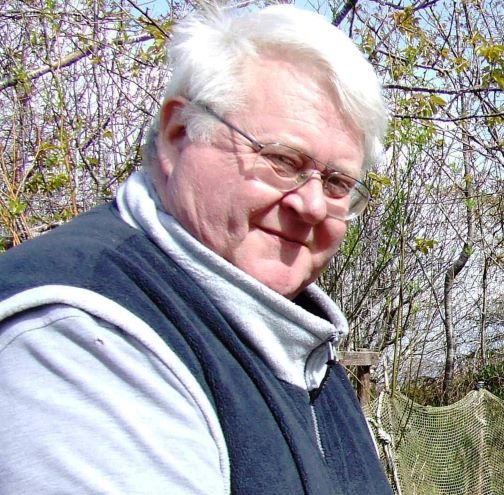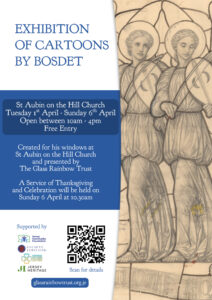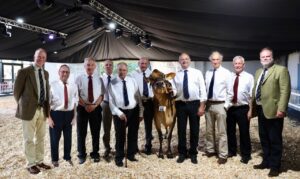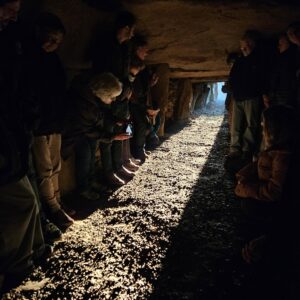
A few years ago, RURAL magazine organised a series of lectures, titled, What’s for Dinner?, on various aspects of farming and food production. The talks were given by speakers from the UK and their visits were sponsored by the Howard Davis Farm Trust and the Royal Jersey Agricultural and Horticultural Society.
One of these speakers, Graham Bell, delivered a talk on permaculture, which was received with acclaim by the audience. We became good friends at the time of his visit and intermittently kept in touch afterwards.
We had arranged that he would write about permaculture for the RURAL magazine website, with the first instalment to be published this spring. Also, we had made provisional arrangements for him to return to Jersey in the autumn so as to lead a workshop on permaculture.
When I heard nothing from him since our last telephone conversation in February, I telephoned him a week before the first instalment of the RURAL POST newsletter was due to be published to find out how things were.
To my great sadness, his wife, Nancy, told me that he had died a month earlier after a short but sudden illness. He was aged 69.
His death has not been marked by any formal obituary. However, a visit to his website: grahambell.org offers a window into his life and worldview. One section of the website: ‘In my own words’ is a piece that will have to do instead of an obituary and which follows below.
An essay by Graham titled ‘What is permaculture?’ may be found on the RURAL website: www.ruraljersey.co.uk/what-is-permaculture/
Graham was a kind and generous man, as well as being a visionary and exponent on permaculture. To his wife, Nancy, and his family, RURAL magazine extends its sympathy. A.C.
The late Graham Bell wrote: The following conversation was recorded between myself and good friend Annie Casey. It was our intention to give an insight into who I am and what is important to me over and above a standard web biography.
It says on your website, changing the world a day at a time? How do you do that in your (anyone’s) everyday life?
Good change takes time. It is incremental. Permaculture is not a missionary activity. It is about modelling better ways of behaving. Better for ourselves, our families, our friends and neighbours – and better for people we don’t know. Building durable, sustainable systems can only be done one day at a time – there are no overnight solutions. It also involves trial and error – the best solution varies with time and place and sometimes our first choices don’t work out. So we need to learn to notice things better, and our solutions evolve over time. One day at a time.
I am intrigued by some of your choices, e.g. explain to me two of your choices, to be an electrician and to do a Master’s Degree in Old English & Linguistics at Oxford? They do not seem odd apart, just when they form part of one person’s history.
Many of my choices have been mistakes…. but sometimes mistakes just take you where you need to go. My Mother, like many of her generation. was passionate that a good education was the way to get ahead. She grew up in Oldham, Lancashire during the depression. She was given away as an eight-year-old child to a childless aunt and uncle. She left school at fourteen and walked ten miles a night to go to evening classes to learn shorthand and typing.
My Father left school at fifteen to join the RAF as an apprentice. But they were both highly educated people. They read widely and never stopped learning or being interested in ideas all their lives. My Mother had a place at the LSE after the war, but no funding to follow it through. In later life she did an Open University Degree. I was put a year ahead in primary school and still came top of the class. I don’t recommend doing this to children as it leaves you open to scary experiences (bullying being not the least of them).
I got a scholarship to Oxford at the age of 18. When I got to thirty and had become interested in the green politics movement I was struck by my lack of manual skills (my father had trained as a toolmaker in the late 1930s and after the war retrained as an electrical engineer). So I went on an adult education course and trained as an electrical engineer and later started my own contracting business. It was years before I really learned to value my degree, when I realised I had always earned my living through the use of language. Being an electrician taught me how to use tools properly and how to be confident in construction skills and problem solving. It also gave me a sense of the proper value of vocational skills as being as important as academic knowledge. Being interested in everything is both a blessing and a curse.
Is it right that you were at an all-boys school in Yorkshire? Did it bear any resemblance to Dotheboys Hall?
I went to Richmond School in Yorkshire, which was a direct grant Grammar School, now long since eaten up into the comprehensive system.
Plus side: great countryside, learning everyday watching the River Swale flowing past the classroom windows. Small classes (only two hundred and fifty boys when I landed there) great teachers attracted by the location. Lots of sports opportunities (still have a problem with who I’m supporting when England play Scotland at Rugby – I was a flanker in today’s parlance).
Downside: A headmaster who treated me evilly and I swear loathed me… recently departed this life so I’ll never get to have that conversation with him. Rampant bullying. Corporal punishment. Often went hungry when older boys stole our food. And months away from a loving family, feeling unloved. I enjoyed a letter in The Times a few years back “If boarding school is character building and fits young men for the real world shouldn’t we just give prefects the right of life and death over younger boys?” To me it felt like they already had it. I’m amused by both John Peel and Stephen Fry’s autobiographies where they talk about how awful their public-school days were and then try to say ‘It did me no harm’. Right. Given how many of our senior politicians went to boarding schools do you need any better explanation of how to create dysfunctional men?
You have travelled a lot in your business-life. Do you have a favourite place (apart from home)?
I have been all over the UK and Ireland, most countries in Europe, the USA, West Africa, Israel and Palestine, Australia.
Favourite places include (randomly):
Sandy beaches on the Padstow peninsula, and the Eden Project Cornwall
Rannoch Moor Perthshire/Argyll as a transition space between the Black Wood of Rannoch, Highland Perthshire and Glencoe and the route to Skye…
Anywhere the Nabateans hung out (Avdat is extraordinary and I would love to visit Petra)
Geysir and Thingvellir, Iceland
The Ashdown Forest, especially if you get to play Poohsticks under Hundred Acre Wood (the Forest of Dean and the New Forest are close behind)
Salisbury Cathedral – built by hand over four hundred years, how come we can’t build like that anymore with all our technology?
Mount Teide and the journey to the Botanic Gardens, Puerto de la Cruz Tenerife huge contrasts in just a few miles
Scott’s View, The Scottish Borders
Dunkertons Cider Farm, Pembridge Herefordshire – how a small business should be run
Cragside, Rothbury Northumberland – first house in the UK with electric light- Lord Armstrong’s gaff.
The Island of Bali, fantastic culture alongside sub-tropical abundance probably not as good now as when I went there thirty + years ago.
The prehistoric temples on Malta and swimming in the sea off Comino
Slovenia, great country, great people.
Elsinga Planetarium, Friesland, Netherlands – world’s first, built by one man (Eise Elsinga 1774-1781) in his living room
…and yes, my own forest garden.
You and your wife Nancy had a bicycle business. How did that come about?
I met Nancy through bicycles. In the late seventies I got interested in Green politics, and in an attempt to move politics to crossing the boundaries invented Green Fairs. Ours ran for a couple of years in Deptford, a deliberate choice to site ourselves among the poorer parts of South East London. Nancy turned up year two after frequent badgering from me to represent her then employer, The London Cycling Campaign. One night she stayed after an after-party. We discovered we had the same birthday.
In 1986 we decided to start a family, and we didn’t want to bring up young kids in London, so we moved to the Scottish Borders and bought an old stable block. I set about doing up buildings. Our partners in the enterprise were connected with us through a mutual interest in cycling. I was persuaded to start importing and distributing interesting cycle products. We pioneered the cycle trailer market in the UK, (a boom industry since), recumbent cycles (which haven’t taken off to the same extent) and most rewardingly cycles for people with access challenges. Neatwork was a great business which ran for eight years without ever really becoming profitable. We effectively sold-out to business angels who managed to bury the business in a year when I moved on…
What advice would you give to anyone starting up in business?
Know what you are letting yourself in for. Get a good team around you. Have a plan. Understand that it’s always going to work out differently from the plan. Learn from your mistakes. Don’t make terminal mistakes. Be good at getting out of bed in the morning and expect to work hard. Do what you say you will, when you say you will, for the price you said you would and clean up after yourself. Enjoy keeping accounts. Know when (and how) to stop. Pace yourself. Get good mentors and listen to what they say. Believe in yourself (if you don’t no-one else will).
Tell me about your book collection?
Books are hugely important to me. They are one of the most valuable tools I know. I can gather information and ideas from them. I can also learn from other people’s life experiences. They develop my language skills. They keep my brain and my emotional life active. Emotional intelligence is quite as important to me as factual reasoning. They insulate the house. The last time we counted there were four thousand of them.
What would be your desert island book?
Always Coming Home, Ursula Le Guin (1985) although with 4,000 books in my library I’d settle for a digital notebook and an online connection.
What for you, is the best thing about being a father and grandfather?
Having a son, a daughter and a grandson (and in laws) to love to bits and be immensely proud of. Remember they’re the ones who decide what home to put you in.
Music plays a big part in your life and the life of your family. Where did that spring from?
My Mother always loved to sing. Especially when doing the washing up together. My Mother (who was a reasonable alto) and my father (who was tone deaf) always sung us to sleep at night when we were little. I grew up thinking I couldn’t sing. Aged fifteen I taught myself to play guitar. At sixteen I got double bass lessons, and instantly ended up in Youth Orchestras (there’s always a shortage of double bass players). My Dad cursed me and advised the piccolo (he had to drive me about a lot). When we had children, I sang to them and learned I could sing (or at least I learned to enjoy singing and stop worrying about how good I was). I’ve always used it as a teaching tool when imparting Permaculture. My daughter has a lovely voice and my son is a great fiddler, singer and plays a host of other instruments a bit. I’d love him to entertain us more, but he prefers to play with his friends. One of my heroes is the late Jim Couza who said “Singing together makes us strong.”
What piece of music stirs you most?
Blimey- if I’m only allowed one? A Walk in the Paradise Garden, Delius. But many others… I am passionate about music.
Tell me about your garden.
It’s a life’s work, an ambition constantly being realised. It’s a soft factory where food and fuel create their own abundance. It’s a classroom and the best meditation space I know. It’s a place to be in love and to play and to eat out. It’s an energy source and a living changing example. It’s a work of art and a solace. It’s a home. It always listens to me- and answers back so I have to listen to it. It’s never stopped being my friend.
You encouraged your children to be involved by the garden. Was that difficult to do?
No. They loved it and still do.
Your forest garden has been an inspiration to me and others; how does that make you feel?
Worthwhile.
Out of all the people you have met, were you ever star-struck?
I only ever met one person that made me feel he was much cleverer than I was and he ended up a barrister defending serious drug barons, so maybe my judgement was adrift. And I’m acutely aware I haven’t always behaved intelligently myself. I’ve met lots of people who are brilliantly creative, which always impresses me. But star-struck? No. I’ve met lots of people I instantly wanted to fall in love with. Is that star-struck? I believe we are all equally worth a hearing and respect, until proved otherwise, so I tend to try and offer that level of respect to everyone I meet and look for it to come my way from them. From the Queen and First/Prime Ministers (I’ve met a covey of top rankers including them) to plenty of people with learning difficulties. If people don’t get that, then they’re not high on my list of heroes.
What irritates you?
People who talk down to others.
What fills you with joy?
The dawn chorus, sunrise and sunset, my family (most of the time), the openings of great choral works, the sound of running water, simple kindnesses, the gift of life.
What are you most proud of?
The opportunity of serving others.




